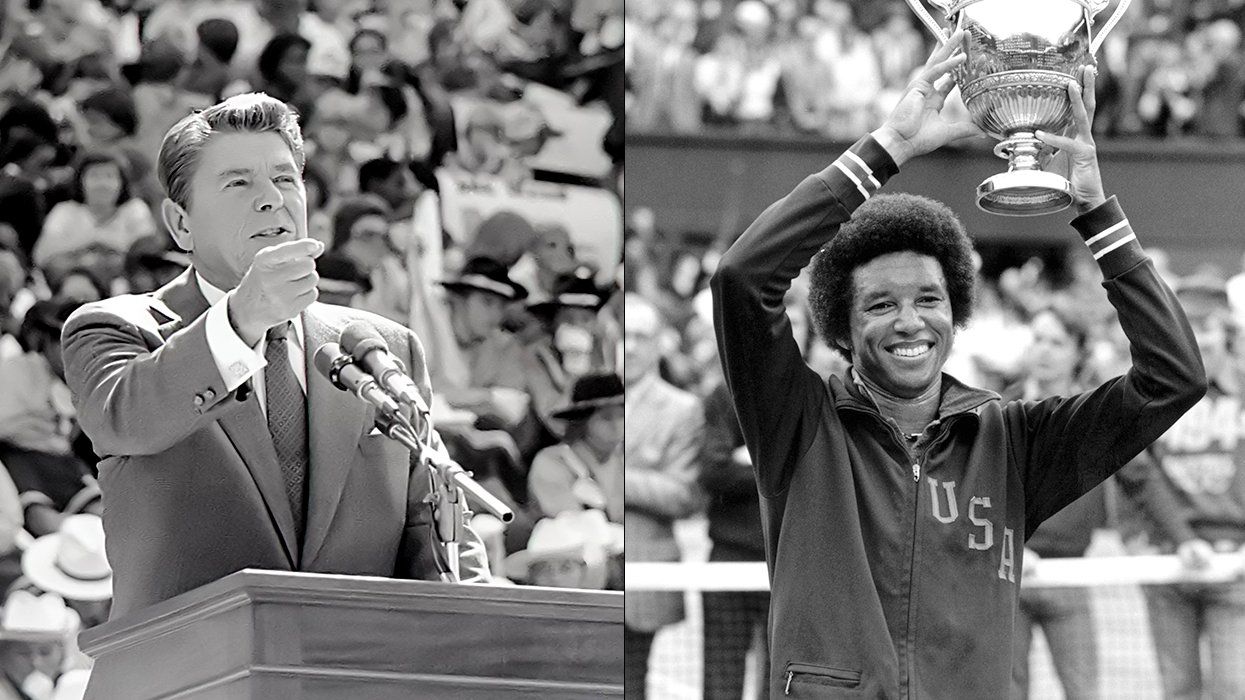I have a thing with dates, meaning that for just about every day of the year, I can pin a birthday, historic anniversary, or a personal or famous death on them. February 6 has long stood out for me because that is Ronald Reagan’s birthday – he would be 113 this year — and the day tennis legend Arthur Ashe died in 1993.
Keep up with the latest in LGBTQ+ news and politics. Sign up for The Advocate's email newsletter.
I vividly remember the day Ashe died and noting in my head that it was also Reagan’s birthday. I felt horrible about Ashe dying of AIDS complications. As a tennis fan, I also knew the enormous impact he had on the sport by breaking barriers. In 1993, Reagan turned 82, and it would be a year before he announced he had Alzheimer’s.
Over the years, as February 6 popped up, I’d remind myself about Reagan’s birth and Ashe’s death on this day, and as the years have passed, the dichotomy between the two could not be more profound. As a historical figure, whose impact was monumental, it was Ashe – not Reagan – who was the most consequential.
Time has given us immeasurable examples of how Ashe was a transformative figure, not only in helping to create a path in tennis and sports for Black athletes but also in the fight against HIV and AIDS. Time has also shown, with remarkable consistency, the evidence of Reagan as a racist and someone who blatantly ignored the AIDS crisis.
When author Ralph Wiley spoke to Ashe for a book he was writing, he asked the civil rights and tennis legend if living with HIV was the hardest thing he’s ever had to deal with. Ashe’s response spoke volumes: "No, the hardest thing I've ever had to deal with is being a Black man in this society.”
In a now-famous phone call between President Richard Nixon and Reagan after the United Nations decided to acknowledge the People’s Republic of China, Reagan, governor of California at the time, called Nixon to discuss the news. Reagan recounted his experience watching the event on TV: “Last night, I tell you, to watch that thing on television as I did. To see those, those monkeys from those African countries — damn them, they’re still uncomfortable wearing shoes!” he said.
Ashe fought for most of his life to end racial discrimination in those African countries Reagan denigrated, including apartheid in South Africa. Ashe famously produced a groundbreaking documentary, Sports and Apartheid, for ABC, worked to have tennis matches canceled in South Africa, and was arrested at an anti-apartheid rally in Washington, D.C., in January of 1985.
In 1982, when a reporter questioned White House Press Secretary Larry Speakes about AIDS, he replied callously, “What’s AIDS?”
“It’s known as the gay plague,” the reporter responded.
“I don’t have it, do you?” Speakes replied to a room full of laughter.
Reagan never uttered the acronyms AIDS or HIV until 1985, years after the plague had progressed and killed millions worldwide.
When it was heavily stigmatized, and when he was fighting for his life, Ashe was forced to come forward to admit he had AIDS in the spring of 1992. Media outlets threatened to out his affliction, so Ashe disclosed his illness, and in the short time he had left, he pushed forward as a fierce advocate for those with the disease. In December of that year, he spoke at the World Health Organization’s World AIDS Day, where he pushed for further funding to fight the disease.
Ashe went on to start the Arthur Ashe Foundation for the Defeat of AIDS, which pledged 50 percent of its funding to countries outside the U.S. that were fighting the plague. Reagan was so much in denial about the disease that when Rock Hudson died of AIDS, he watered down the public statement from the first couple, striking words that eventually made Hudson sound like a long-lost distant relative, rather than a lifelong close friend.
History and time have shown the influence of both men on race and AIDS. Ashe comes out as a hero and champion, while Reagan is exposed as a coward and bigot. In his short time on Earth, Ashe became a civil rights and tennis legend, an anti-apartheid crusader, and an outspoken AIDS activist.
Reagan vetoed a 1986 bill, the Comprehensive Apartheid Act, which levied economic sanctions against the Republic of South Africa. Congress eventually overrode the veto by a lopsided margin. He also vetoed the Civil Rights Restoration Act, which required entities receiving federal funds to comply with civil rights legislation. Congress again overrode Reagan's veto.
And during the height of the AIDS epidemic, Reagan's federal budget for 1986 included an 11 percent decrease in AIDS funding: from $95 million allocated in 1985 to $85.5 million proposed for 1986.
Now, next year when February 6 comes up on the calendar, whose legacy will you remember fondly, and whose incapacity will you try to forget?





































































Charlie Kirk DID say stoning gay people was the 'perfect law' — and these other heinous quotes